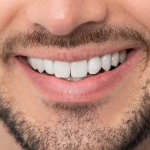Gum Disease
Gum disease is very dangerous and can cause tooth loss in adults. It can occur at any age, but is more common in adults. It can be easily treated with an initial diagnosis by a doctor.
Not brushing regularly and not flossing can cause plaque to form, and the bacteria in dental plaque, in addition to affecting the gums and teeth, can also have a detrimental effect on the gum tissue and the bone that supports the teeth. Turn the gums. Therefore, poor oral hygiene is the most common cause of gum disease.
In the early stages of gum disease, we can refer to it as gingivitis because it is caused by inflammation of the gingival tissue and accumulation of plaque on the teeth. If the dentist diagnoses the inflammation in time, treatment is easier. Prevent gum damage by going to the dentist and having a proper diet and regular use of toothbrushes and floss.
Periodontitis is an advanced form of gum disease, although it can be treated, but it forces dentists to use more difficult techniques such as deep root canal cleaning or germs and scaling the gums. But periodontitis not only affects a person’s gums, it can also cause tissue and bone loss throughout the mouth. If this happens, your dentist will recommend that you see a periodontist who can recommend more advanced methods to rebuild lost bone and tissue.
Symptoms of gum disease
Bleeding gums: Some people experience bleeding gums when eating or brushing, which is a mild sign of gingivitis. Fortunately, the disease is cured by brushing and flossing regularly as well as cleaning.
Bad Breath: Certainly, many people have experienced bad breath in some situations. If this odor is permanent, it is a sign of gum disease, because bacteria go under the gums and flossing is not possible with a toothbrush, and it smells like rotten apples. And alcohol is created.
Changes in the distance between the teeth: If you have gum disease, after a while the front teeth tend to move forward or backward, in a situation that did not exist before.
Inflamed and red gums: Red, inflamed or narrow gums can be another sign of gingivitis. To prevent the disease from progressing, be sure to see a dentist, because in more serious cases, it can cause the gums to recede from the teeth and the gums to become sac-like.
Sensitive teeth: The sensitivity of your teeth can be caused by brushing hard on the tooth, or by reducing the gum tissue, the root of the tooth, which is less than the outer enamel and causes allergies, appears.
Loose teeth: Adults usually do not have loose teeth, but if you move your teeth by touching your tongue or touching your finger, you may have gum disease.
Tooth scaling: The white or yellow substance on the teeth (mass) becomes hard and tartar with progress, which must be scaled by a doctor, toothbrush and floss have no effect in this case.
Some habits that cause gum disease:
Wear and compression of teeth: Some people grind their teeth as a result of sleeping or waking habits, which causes gum disease because it puts a lot of pressure on the tooth tissues.
Smoking : Research shows that smokers have more tooth mass than non-smokers. In addition, tobacco damage damages the teeth and gums, leading to infection and gum disease.
Stress : One of the reasons that may increase the risk of gum disease is chronic stress because it makes it harder for the body to fight infections.
Be sure to see your doctor if you see any symptoms.



